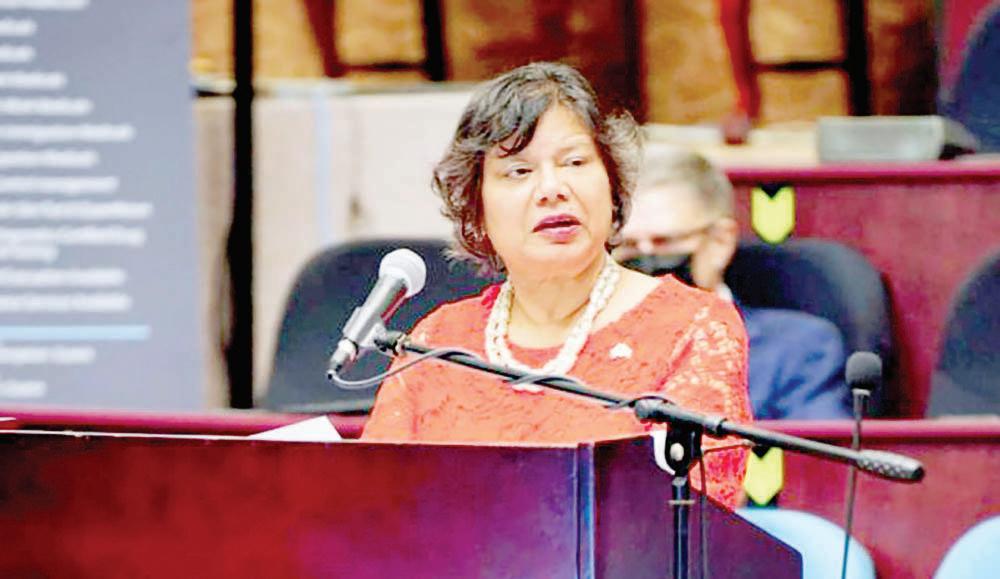NEWS
15
MONDAY, DECEMBER 7, 2020 | GUYANATIMESGY.COM
Sexual Offences Courts reduce insensitive treatment to victims of sex crimes – Chancellor
The establishment of specialised courtrooms to handle matters pertaining to sexual offences has significantly reduced the often insensitive treatment and victimisation or re-traumatisation of victims of such crimes, according to Acting Chancellor of the Judiciary Justice Yonette CummingsEdwards. This was revealed by the woman who stands at the helm of the Judiciary in remarks to commemorate the third anniversary of the Sexual Offences Court in Georgetown which was established on November 13, 2017. Two years later, in 2019, similar courts were established in Berbice and Essequibo. Justice CummingsEdwards pointed out that as victims of sexual assault seek access to justice, some have with great reluctance, recounted their experiences in court. She noted that some victims have refused to seek justice because of unpleasant experiences. But apart from the ordeal of being sexually violated, the Head of the Judiciary pointed out that it seems that the instigative and adjudicative environments have a great role to play. “During the investigative process, victims have had to give statements to the police. If charges are laid, the victim has to relate the same story before the Magistrate’s Court and the public and more often than not before a Judge, jury, members of the public and at all times in front of the accused/defendant.” Justice CumminsEdwards further noted, “Some virtual complainants have described the giving of statements and testifying as an ordeal. Some have said it is very traumatic. Others have said that they have to relive the harrowing experience even as they seek jus-
tice. In some cases, they have opted not to testify to save themselves from embarrassment, shame and ignominy.” According to her, Parliament, in recognition of this fact, promulgated laws to assist victims as they testify and relive the burden and demands of a trial. The Sexual Offences Act of 2010 makes provision for the establishment of a Sexual Offences Court. She said that the specialised courtrooms cater to the needs of both victims and defendants and allow for special measures for witnesses to testify. “This is perhaps the most outward-looking and progressive of all the legislative measures,” the Chancellor related. She explained that this legislative intervention provided for in-camera hearings ie (exclusion of the public from hearings), the anonymity of the victims, especially in reports carried by the media, among others. Though this provided a glimmer of hope in terms of the victims being confident or not so afraid or ashamed to testify, Justice CummingsEdwards pointed out that it was not enough since the reporting rate of offences was still low compared to the rate of commission. According to her, the physical settings of the court include the use of screens for vulnerable and intimidated witnesses to prevent them from seeing the accused while giving evidence. She said that the witness must, however, be visible to the Judge, jury and defence counsel. The courtrooms have an audiovisual live link (or close circuit TV) which enables the witness to give evidence during the trial from outside the court through a televised link to the courtroom. The Chancellor added that the
Acting Chancellor Judiciary Justice Cummings-Edwards
of the Yonette
trial Judge can direct attorneys to remove their gowns while a vulnerable witness is testifying. The courtrooms also cater to the examination of a witness through a sworn intermediary to assist the witness to give his or her evidence. The intermediary is allowed to explain questions or answers so far as necessary to enable them to be understood by the witness or person in question. The Sexual Offences Courts also allow for the use of anatomically correct dolls for taking evidence from children who may have difficulty verbalising the details of their assault. Justice CummingsEdwards informed that the courts provide for the integration of all social workers and care providers, forensic interviewers and other stakeholders in the criminal justice system to reduce the often insensitive treatment of victims of sexual offences and reduce secondary victimisation or re-traumatisation of victims. “The input of psycho-social services and counselling by social workers/probation officers and others must be hailed as these personnel understand the dynamics of society and the vulnerability of marginalised groups and can assist both victims and accused persons,” she added. “The Sexual Offences
Focus to be placed on strengthening immune systems – RHO …as Region 10 records over 300 COVID-19 cases
R
egional Health Officer of Region 10 (Upper DemeraraBerbice), Dr Gregory Harris has indicated that more emphasis would be placed on educating persons on good nutrition and strengthening their immune systems, as the Region has recorded over 310 confirmed cases of the novel coronavirus disease (COVID-19). In dealing with the spread of the virus, Dr Harris said the Regional Health Department (RHD) would be increasing its public educational engagements and enforcement activities. Further, he stated that mask distribution exercises would continue, and the Department would seek to look into curbing the alleged occurrences of “secret parties” within Region 10.
Region 10 Health Officer, Dr Gregory Harris
According to Dr Harris, the Department will also be collaborating with stakeholders. The most recent statistics provided by the Health Department showed that 1300 persons were tested within the Region, with
the number of active cases reaching more than 70. On Friday, Region 10 recorded its 310th case. Regionally, there were four persons in institutional isolation, 65 in home isolation, three in institutional quarantine while 40 persons were in home quarantine. Some of the areas that are being monitored are Aroaima, Canvas City, Central MacKenzie, Amelia’s Ward, Half Mile, Wisroc, Three Friends Mines, Blueberry Hill, Kwakwani, Christianburg, Retrieve, Block 22, One Mile, Kara, Coomacka Mines, Wismar, and Silvertown. Meanwhile, 230 recoveries were recorded, with the death toll remaining at five. A total of 40 tests were conducted last week.
Court has adopted an integrated approach among all stakeholders in the criminal justice system to improve the adjudication and delivery of justice. This court aims to respond to have faster disposal of cases in an environment that respects the privacy and the dignity of victims. It employs special measures to aid witnesses in giving their testimony.” The Chancellor noted that the Judiciary is reminded of the fact that “courts exist to do justice between the
litigants, through balancing the interest of an individual litigant against the interest of litigants as a whole in a judicial system that proceeds with speed and efficiency” as noted by former Judge of the Caribbean Court of Justice (CCJ), Michael De La Bastide. “In so doing we help to enhance social order, maintain the rule of law, ensure due process of law and provide for equal protection of citizens. We are committed to ensuring access to justice
and to keeping the wheels of justice turning,” said Justice Cummings-Edwards in concluding. The Sexual Offences Courts were established through a collaboration between the Supreme Court of Judicature Guyana, UNICEF, Social Protection Ministry and the Jurist Project, all long-standing partners of the court. Funding for these modern, survivor-friendly courtrooms was donated by UNICEF.
PAHO/WHO reps discuss improved health care for Region 10
Regional Health Officer (RHO), Dr Gregory Harris (right) and Regional Chairman Deron Adams along with Regional Democratic Council Public Relations Officer Leon Roberts (left) and PAHO/ WHO officials
R
epresentatives of the Pan American Health Organisation/ World Health Organisation (PAHO/WHO) recently met with officials of Region 10 (Upper Demerara-Berbice) to discuss improving health-care delivery in the Region. The representatives, Dr Luis Codina and Dr Jean Alexandre paid courtesy calls on Regional Chairman Deron Adams and Regional Health Officer (RHO), Dr Gregory Harris.
During the discussion with the Regional Chairman, topics such as strategies to improve the level of vaccinations within the Region were addressed after it was related that parents were refusing to take their babies to be immunised. This, the Regional Chairman said, has resulted in the children having to take several vaccines in succession in order to qualify for entry into the school system.
During the discourse with the RHO, ways in which specialised services can be strengthened at hospitals within the Region were discussed as well as the improvement of healthcare services in riverine communities such as along the Demerara and Berbice Rivers. The officials also discussed improved access to quality health-care services in these areas, as the RHO cited plans to have doctors stationed at these locations.



